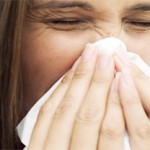
Get These Motherfucking Aches of this Motherfucking Plane.
The majority of flu transmission occurs five to seven days after a person becomes sick, meaning that about 87% of people who spread the flu know that they have it. Over 200,000 people are hospitalized every year due to flu complications, and many patients (mostly young children, pregnant women, and the elderly) pass away. Basically: if you know you have the flu and decide to board a plane, you may be committing manslaughter. Seriously.
Airplanes, which are cramped and poorly ventilated, exacerbate the spread of flu by preventing disease particles from dissipating. However, there are four crucial things you can do to minimize the impact of flu on your holiday travels (besides simply washing your hands).
1) Get the flu vaccination
It comes in both an intramuscular (shot) form and a nasal spray. And, no, the flu vaccination doesn’t give you the flu. It can cause sluggishness for a few days, but it’s so much better than the alternative. The reason why some people get the actual flu right after getting the shot is because they go to a clinic or hospital for the vaccine, thus exposing themselves to flu patients long before they have a chance build immunity. The vaccine isn’t giving them the flu: the hospital is. It’s always best to get your shot in a drugstore or in a place mostly devoid of sick people.
2) Identify Your Symptoms
The vaccine is extremely helpful in preventing flu, but is not always 100% effective. If you think you have the flu, don’t get in a plane or any multi-passenger vehicle (except, maybe, an ambulance). Identify the symptoms:
a. Aches
b. Fever
c. Chills
d. Tiredness
e. Sudden Onset (very important)
f. Coughing
g. Sneezing
h. Sore Throat
3) Buy Travel Insurance
Travel sites like Orbitz and Expedia offer travel insurance plans that protect against medical emergencies. If you get the flu at the last minute and call your doctor for confirmation, your ticket can be fully refunded. That way, if you have the flu, you can stay home and not lose hundreds of dollars on a non-refundable ticket. Always buy travel insurance during the winter holidays, when flu season is at its peak. Although having to postpone your travel plans can be a complete bummer, you can still save your moneyand a life.
4) Facemasks
Facemasks are helpful in preventing transmission of flu, but have not been proven to prevent initial infection. Basically, if you wear a facemask when you are sick, you will reduce the likelihood of transmitting the virus. However, wearing a facemask around all day isnt going to prevent you from getting the flu in the first place. If you think you might be getting sick and have to travel, wear an N-95 respirator and surgical mask (not a simple surgical mask). Respirator masks help filter out smaller particles, which can help prevent the spread of viruses. 3M N95 Healthcare Particulate Respirator and Surgical Mask is a great choice in preventing the spread the spread of flu particles.
